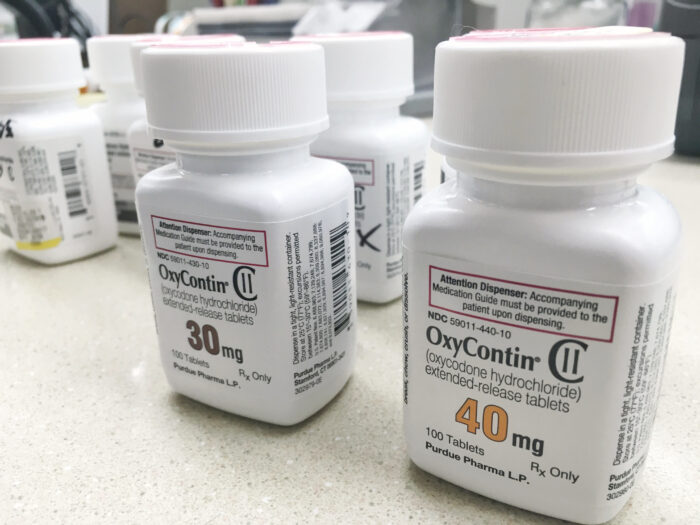Top Class Actions’s website and social media posts use affiliate links. If you make a purchase using such links, we may receive a commission, but it will not result in any additional charges to you. Please review our Affiliate Link Disclosure for more information.

On Sept. 1, the family that owns Purdue Pharma was granted immunity from all future opioid lawsuits — although they will forfeit ownership of Purdue while the company heads into bankruptcy as part of a settlement.
It’s a much more favorable resolution for the Sackler family than some critics had hoped for.
In a series of legal briefs, the Department of Justice urged Federal Judge Robert Drain to reject the settlement. Attorneys general for nine states argued the settlement would unfairly deny individuals and governments the right to sue the Sacklers.
Nevertheless, Drain signed off on the bankruptcy settlement, giving the Sacklers a release from any liability for the opioid epidemic. The judge acknowledged the harm caused by Purdue Pharma’s opioid products, which he said contributed to a massive public health crisis.
The deal also grants a release from liability for harm caused by OxyContin and other opioids for not only the Sacklers, but for hundreds of their associates, as well as their remaining empire of companies and trusts, according to court documents.
The $10 billion plan calls for turning the pharmaceutical giant into a new company, with its profits going toward efforts to combat the opioid crisis. The Sacklers have agreed to pay $4.5 billion over the next decade, as well as forfeit ownership of Purdue Pharma, although they admit no wrongdoing.
Purdue Pharma’s impact on opioid crisis has been monumental
The introduction of the highly addictive painkiller OxyContin in the late 1990s has been blamed in part for the opioid crisis, causing millions of Americans to suffer from opioid use disorder.
In 2012, American health care providers wrote 259 million prescriptions for opioid pain medication, according to the American College of Emergency Physicians.
In 2014, there were 1.27 million emergency department visits or hospitalizations resulting from opioid-related complications.
Over 70 percent of drug overdose deaths in 2019 involved an opioid, according to the U.S. Centers for Disease Control and Prevention.
For years the federal government has attempted to hold the drugmaker responsible for the country’s opioid crisis, which has contributed to killing nearly 500,000 Americans since 1999, according to the CDC.
In 2020 alone, there were 69,710 deaths from opioids, which anti-opioid activists blame on the Sackler family. Because of this, activists and some attorneys are not satisfied with the settlement and ruling in the Purdue case.
“A number of the Attorneys general have not signed off on it (the settlement) — it seems like a pittance given the absurdity of the evidence that was presented,” Daniel Truscott of Truscott Law told Top Class Actions.
Truscott has seen the effects of OxyContin on the justice system. He had a case with a 19-year-old boy who was an honor student at Boise State who became addicted to OxyContin after being prescribed it for an injury; he later ended up becoming addicted to heroin, Truscott told Top Class Actions.
“This problem has resulted in some issues that you just have never seen before,” Truscott said. “We’ve had meetings with the federal probation officers that are having meetings with defense attorneys, asking them not to get their clients out of jail … because the addictions are so intense. These kids are getting out of jail and then they’re going right back to the addiction. I’ve been a lawyer for 30 years. I’ve never seen that before.”
Lawyers and governmental officials have similar reactions to the ruling
It’s clear that many activists, families, lawyers and government entities are dissatisfied with the settlement — some say it didn’t include enough money and goes too far in protecting the company and the family who owns it from future liability.
The amount the Sacklers would pay has been widely criticized as too low.
“As the deal is written, the Sacklers pay too little and keep too much–yet they still get to keep their names on hospital wings and museums while avoiding airing the facts in open court. The Sacklers owe us more,” Oregon Attorney General Ellen Rosenblum said in a formal objection.
Michelle Creeden, practice administrator at the National Legal Center and a licensed attorney, told Top Class Actions that Purdue Pharma has generated $30 billion from the sale of OxyContin.
“The $4.5 billion paid over 10 years will hardly begin to repair the opioid epidemic that they caused, let alone compensate the families for lives lost and individuals who became addicted due to the misrepresentations of Purdue Pharma,” Creeden said.
The Justice Department’s lawyers have said the Sackler family is misusing the bankruptcy deal to shield themselves from legal liability, despite not claiming bankruptcy themselves, according to briefs filed by the court. On Sept. 14, the Department of Justice moved to block the deal that would shield the Sacklers.
“The Sacklers were very intentional with the venue they chose and used their vast resources to ensure the most favorable outcome possible,” Creeden said. “The outcome can hardly be referred to as justice. It shows that corporate America and big pharma continue to impact our legal and political systems. Sadly, agreeing to this settlement was probably the only way to recover anything for the plaintiffs and their families who have lost so much.”
Where will the money from the Purdue Pharma settlement go?
The deal is expected to distribute more than $5 billion over the next decade to public trusts created to fund drug treatment and health care programs. The settlement funds will go into a national opioid abatement trust, and states will have the authority to allocate to their local governments. Native American tribes will have a separate fund.
As part of a separate federal agreement, Purdue agreed to pay the Justice Department up to $6.3 billion in civil and criminal penalties.
“No deal is perfect, and no amount of money will ever make up for the hundreds of thousands who lost their lives, the millions who became addicted, or the countless families torn apart by this crisis, but these funds will be used to prevent future death and destruction as a result of the opioid epidemic,” New York Attorney General Letitia James said, according to NPR.
Purdue is now backing a fund to make payments to those who have been harmed by opioids. Under the plan, victims and their families would share a pool of $700 million to $750 million. Amounts would range from $3,500, which most children who were born in opioid withdrawal would receive, to $48,000 for survivors of those whose deaths were linked to OxyContin.
What’s next for Purdue Pharma?
Purdue Pharma will re-emerge from bankruptcy as a new company operated as a form of public trust corporation, according to the company’s website.
The new company that will take over for Purdue Pharma will be allowed to continue making and selling opioid products, but future opioid profits will have to go to help fund drug treatment programs.
The Sacklers will remain one of the richest families in this country, even after the settlement is concluded, Business Insider reported.
“This is a bitter result,” Drain, the judge who approved the settlement, said in U.S. bankruptcy court on Sept. 1.
Drain — who was effectively handpicked by Purdue to oversee its case when it filed for bankruptcy in White Plains, New York, where Drain is the only judge — said the result of his ruling was frustrating because a lot of the Sackler money was actually held in offshore accounts, and he had hoped for a higher settlement.
“When it began to look like your wealth could be at risk from lawsuits, you moved it out of reach, preventing the money from going to the victims of the crisis they created,” U.S. Rep. Carolyn Maloney, chairwoman of the House Committee on Oversight and Reform, said to the Sackler family during a hearing.
“I’d like to say this clearly to the members of the Sackler family: The committee will not allow you to continue hiding from your part in this devastation. You have played a critical, active role in sparking and fueling the opioid epidemic,” Maloney said.
Don’t Miss Out!
Check out our list of Class Action Lawsuits and Class Action Settlements you may qualify to join!
Read About More Class Action Lawsuits & Class Action Settlements:















70 thoughts onThe Controversial Purdue Pharma Bankruptcy Settlement, Explained
Ive been part of this Purdue lawsuit since the beginning. I found my husband dead from an overdose. I havent heard anything about it from the attorneys in over 2 yrs now.
is it possible to still sue 9 years theyt had me on them got copies of my scripts stopped counting at 30000 30 mg ir ocydodone took me 2 years tp get off them myself